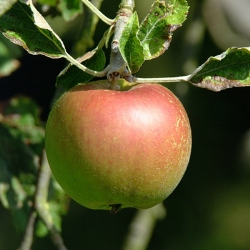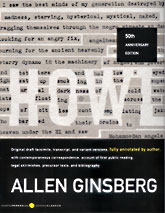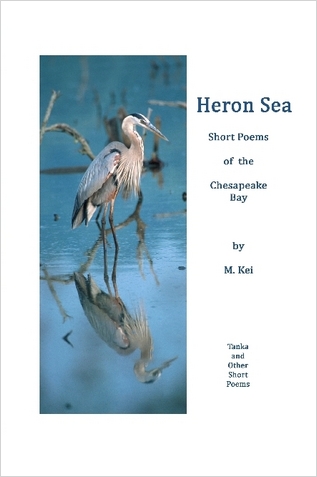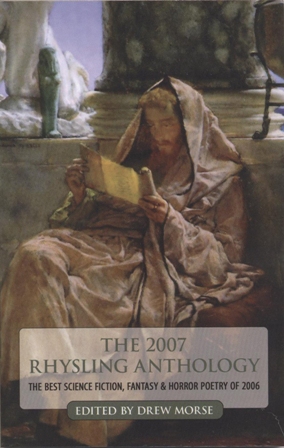
|
Christopher T. George is co-editor of Loch Raven Review.
George was born in Liverpool, England in 1948 and now lives in
Baltimore, Maryland, near Johns Hopkins University, with his wife Donna
and two cats. Chris works full-time as a medical editor in Washington,
DC. He has been writing and publishing poetry since he attended Loyola
College, Baltimore, and studied with Sister Maura Eichner at the College
of Notre Dame, as well as with poets Elliot Coleman and Marion Buchman.
His poems have appeared in numerous publications in the United States
and Great Britain. He is also a published historian and a lyricist for a
new musical,
Jack-The Musical, about Jack the Ripper. George also is the
Editor of
Desert Moon Review and an editor at
Writer’s Block Poetry Workshop.
Allen Ginsberg (1926–1997)was a leading apostle of the beat generation. His first published work, Howl and Other Poems (1956), helped define the '50s with a sweeping vision reminiscent of how T. S. Eliot’s The Waste Land captured the 1920’s. His second major work, Kaddish (1961), described his anguished relationship with his mother. In the 1960s, he vigorously participated in the anti-Vietnam War movement, publishing works such as Reality Sandwiches (1963) and Planet News (1969). The Fall of America received the National Book Award in 1974. M. Kei is an award-winning poet and editor of short poems, specializing in the tanka genre. Heron Sea is his first collection. A poet of the Chesapeake Bay, he is the editor of the Chesapeake Bay Haiku Almanac as well as Fire Pearls, Short Masterpieces of the Human Heart. His poetry appears in journals such as Modern English Tanka, Simply Haiku, American Tanka, Modern Haiku, and more. He is a winner of the Tanka Splendor 2006 contest and a Runner-up in the Lighthouse Poetry Contest. His poetry appears in the anthologies Haiku Miscellany (Croatia), To Find the Moon (USA), Sixty Sunflowers (forthcoming) and Landfall (forthcoming). |
Fall 2007 Table of Contents - Vol. III, No. 3 |
|
|
Poetry Translations Interview Essays Fiction Book Notes & Reviews |
|
|
Allen Ginsberg, Howl: The 50th Anniversary Edition, Harper Perennial, New York, 194 pp., 2006, Softback, ISBN 0-06-113745-6, $18.95. The only other facsimile edition of a poem that I have ever owned was an edition of T. S. Eliot’s The Waste Land, which I unfortunately had to later sell at a used book store to “make ends meet.” Oh, the horror! In his essay, “Performing Allen Ginsberg’s Howl” in this issue of Loch Raven Review, Gregg Mosson correctly sees a relationship between Ginsberg’s mid-century epic and T. S. Eliot’s post-World War I epic poem, so the connection is a valid one, even if Mosson extends the genesis of Howl back even further to Walt Whitman and William Blake. There is certainly a case to be made that Ginsberg spoke to his post-World War II generation, those living in the shadow of the threat of the Hydrogen Bomb, much as Eliot spoke to the generation who grew up after the “Great War” with all its incipient modern horrors: nerve gas, aerial bombing, machineguns, tank warfare, etc. Nonetheless, it is interesting and rather telling that the publishers of this anniversary edition of Howl chose as a back cover blurb not a statement by a poet or a critic but by Bob Dylan. Now, of course, many would say that Dylan is a poet, although the truth of that claim might be debatable, whether the former Robert Zimmerman aka the writer of “Blowin’ in the Wind” really stacks up next to the best poets of the twentieth century. But this should also remind us that the late Allen Ginsberg (1926–1997) was perhaps as much entertainer as he was a poet. At least in his later years, when he played to enthusiastic hippie, liberal, and gay audiences. And Harper’s appear to recognize that reality in choosing the quote from Dylan. The statement reads: “Ginsberg is both tragic and dynamic, a lyrical genius, con man extraordinaire, and probably the single greatest influence on American poetical voice since Whitman.” Well, let’s just let that last claim dangle, shall we? The first thing to be said about this book is that, despite the subtitle “50th Anniversary Edition,” this edition was not been published in 2006 for the first time. Truth to tell, the book is actually a softback version of the same book that was published in 1986 in hardback at the time of Ginsberg’s last revision of his magnum opus on the thirtieth anniversary! This is a large-size nearly 200-page edition that provides us with the publication of the 1986 version of the poem, a transcription in two-color format showing what was changed from the original version of the poem, the actual facsimile pages of the typewriter sheets that the poet hammered out initially in San Francisco and then revised in various locations, commentary by the poet himself and by Barry Miles, and pertinent photographs and correspondence. So it is a much larger production than the first pocket-size City Lights edition with its distinctive black and white cover that contained “Howl” and several more minor poems. But oddly and conspicuously it does not contain William Carlos Williams’ introduction to the poem that was featured in that first edition. Perhaps some copyright problem with City Lights or Williams’ estate caused the essay not to be available for publication in the anniversary volume. Also while the book under review includes valuable correspondence between Ginsberg and other literary peers such as William Carlos Williams, Richard Eberhart, Lionel Trilling, Lawrence Ferlinghetti, Jack Kerouac, and John Hollander, one letter of early June 1956 from Ginsberg to Williams frustratingly appears in the book heavily edited with the note “A much longer excerpt from this letter may be found incorporated by William Carlos Williams into Book Five, Paterson, with Ginsberg’s signature reduced to initials.” Perhaps copyright problems intervened again, however, if the present book is meant to be the last word on Howl why couldn’t the publishers have done everything possible to include WCW’s introduction to the 1956 edition and the complete text of Ginsberg’s letter of June 1956? There might also be a bit too much commentary on the poem by Ginsberg himself and not enough by independent critics who might have shed more light on the poem than the creator himself could. For example, do we really need the aside from the poet re the line “Cocksucker in Moloch” “Ref. Jean Genet, another literary cocksucker.” But perhaps these are minor quibbles compared to the boon to the poetry aficionado who wishes to gain some insight into Ginsberg’s method of working and into who his influences were. Howl is undoubtedly a landmark poem of the twentieth century and it is nice to get a closer view of its creation and this the book certainly provides in spades. Also we learn who the dedicatee, Carl Solomon, was—an intellectual that Allen met while they were both hospitalized at the New York Psychiatric Institute. It is delightful, in a way, to see Ginsberg in the short essay “Reintroduction to Carl Solomon” (p. 111) squirm at the fact that he had thrust this relatively minor figure into the full glare of public scrutiny by attaching the man’s name to the poem. And in a very real way, Solomon can be seen as a muse to Ginsberg during the poem’s creation. The poet’s invocation of Solomon’s pain at being victimized by the system serves to symbolically deputize for the poet’s and, by extension, America’s pain at mid-century in the shadow of the hydrogen bomb. It is one of the themes that drives the poem as well as Ginsberg’s railing at Moloch and the military-industrial complex. It is moreover fascinating to see how Ginsberg wrested with various passages in the poem to come up with the correct and appropriate words, as for example, concerning those famous opening lines:
-- that in a later version the poet toyed with the lesser wording “wandering around the negro streets at dawn. . . .” before coming back to something approaching the punchier version of his original except, interestingly, transposing “angry” and “negro.” Howl: The 50th Anniversary Edition is a superb purchase for lovers of poetry, even given the things that are missing from the book and for what the book could have been and is not.
M. Kei, Heron Sea: Short Poems of the Chesapeake Bay, Lulu Press, Elkton, MD, 90 pp., 2007, Softback, ISBN 0-06-113745-6, $11.95. M. Kei (pronounced “M’kay”), is the pen name of a poet who lives in Cecil County on Maryland’s Eastern Shore. The collection is an attractive and entertaining collection of short poems, mostly tanka and haiku, about the Chesapeake Bay. Here are a two samples:
From my own experience of the Chesapeake Bay, these poems ring very true. Turkey Point is situated very dramatically on Elk Neck, a point of land between the Elk and the North East Rivers, east of where the Susquehanna River issues out into the Bay from its long journey from upstate Pennsylvania into Maryland. I was there early one cold spring day after a storm and blocks of ice and trees were being pushed into the Bay by the swollen Susquehanna. A sight not to be forgotten. Well, M. Kei well captures such natural sights as well as farmhouses and mills:
This is a highly recommended and expertly crafted collection of short verse. If you like short form poems or you love the Chesapeake Bay (or both!) this book is for you.
The 2007 Rhysling Anthology: The Best Science Fiction, Fantasy & Horror Poetry of 2006, edited by Drew Morse, Science Fiction Poetry Association, Carbondale, Ill., 131 pp., 2007, Softback, ISBN 978-0-8095-7219-9, $12.95. The 2007 Rhysling Anthology gathers together a selection of the best poetry published in science fiction, fantasy, and horror magazines in 2006. The book under review represents a welcome collection of thought-provoking poetry that will appeal to lovers of poetry beyond those fields. An example is the poem “As the Moon Loses Its Smile” by Deborah P. Kolodji, a widely anthologized poet who happens to be the current President of the Science Fiction Poetry Association (SFPA): As the Moon Loses Its Smile Lured in by a smile I followed the alien pied piper into the ship bay. From a wall in the Louvre the Mona Lisa must be smirking— I’ve been scammed. Somewhere a child is reading about Alice and the Cheshire Cat I’m seeing a grin without a human face behind it and I’d much rather be in a rabbit hole. I’ve heard old re-runs play in the depths of space. “Smile, you’re on candid camera” On launch night the quarter moon beamed for awhile until we passed it solid and round growing smaller until disappearing from portholes— our smiles lost to the earth Another interesting example from the collection is the following poem by Mike Allen, whose poetry has been recognized with awards in the Rhysling competition. SFPA members vote each year to award prizes to the best anthologized poems in either the best short form category (49 lines and under) or long form category (50 lines and over). Mr. Allen’s poem is one of the shorter poems in this year’s anthology: Manifest Density Let’s play a game of chicken with the Universe. Let’s extend our suburbs to the quasar edge. Let’s burrow condos into every moon, open discount stores at each new sun, carve two-way traffic tunnels through spacetime, plan cul-de-sacs of gated nebulae. Let’s evangelize all unearthly aborigines. (They too need Slurpee cups and no U-turns.) Let’s fill the empty saddle with ourselves. And if we can’t kickstart the Big Crunch with our Masses, let’s break bacchanal through all the thinning Cosmos to keep each other warm as the stars die. Lastly, here is an excerpt from the somewhat longer poem “First Festival” by Samantha Henderson, a work that deals more with fantasy and myth, and is interesting for that: Idiot girl— I said you weren’t ready to take the mask of a God, not yet not your first festival, but given your skill and arrogance, I might have known that you would try. But, to take the Scarlet Vixen, I could weep, were I not so angry. The Ape of Sorrows, yes, he would not have allowed it, for he is gentle, and the Laughing Jackal— he doesn’t care. Any number of Shadows, Daemons, Tagalongs— any of those you could master. Damn! you could have tamed them your first season. But you— you had to seize the Lady of Beauty, Lady of War, . . . Five years of my precious time, for what? A pitiable thing, sprawled upon my bec, that moans and mumbles through a lipless slit, whose hands are burned away. I know you’re thirsty; here, I’ll drip water in the corner of your mouth, and presently go to the garden, fetch the juice of nightshade berries, and bring you ease. Idiot girl, Fool, double fool, Triple fool me, for caring. We thus see that these colorful poems, while dealing with science fiction, fantasy, or horror themes, still touch the same basic human emotions which serve as the subject matter for all great poetry. An enjoyable and entertaining collection. Recommended.
© Christopher T. George |
|
|
Poetry Translations Interview Essays Fiction Book Notes & Reviews |


